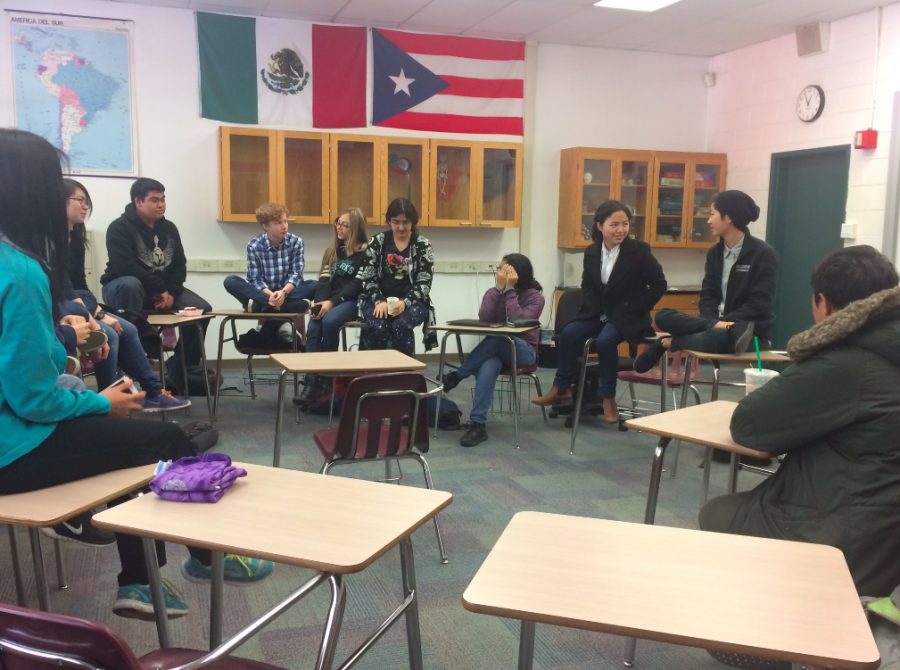Out of the shadows, into the textbook: California public schools add LGBT+ history to common core curriculum
Students in the Gender Sexuality Alliance (GSA) club discuss methods to welcoming LGBT into classrooms and learning environments. They also made plans for their upcoming club week.
January 25, 2017
The California State Board of Education voted unanimously to incorporate the history of the LGBT community into public school curriculums on July 14, 2016, becoming the first state to do so.
California students will begin learning about same-sex marriage in second grade, when teachers introduce families with two parents of the same gender. Two years later, they will discuss California’s first openly gay politician, Harvey Milk, and his contributions to raising awareness about the LGBT community. Content about the LGBT community will be woven into curriculums in this way, culminating in high school U.S. government classes that will discuss the legalization of same-sex marriage.
“Studying LGBT history amounts to studying one of our country’s civil rights movements,” GSA advisor Abel Olivas said. “It’s crucial for students to gain that perspective and to view the various stages of the LGBT struggle through that lens.”
This decision comes as part of a larger campaign to expand and diversify California’s history and social science curriculums known as the History–Social Science Framework for California Public Schools. The framework revises current public school curriculums to include the history of underrepresented groups including ethnic minorities and people with disabilities in classes from kindergarten to 12th grade.
Creating the framework is a step in the process of integrating the content required by the Fair, Accurate, Inclusive and Respectful (FAIR) Education Act, formerly known as Senate Bill 48. This law, which was implemented in 2012, amended California’s Education Code to include minority groups in educational textbooks and school curricula.
The ratification of the FAIR Education Act and the actions taken to uphold its guidelines have garnered support from California’s LGBT community and its supporters, including members of the Genders & Sexualities Alliance (GSA) Network.
“I think the changes to the curriculum are a great idea,” GSA member Amelia Huchley (10) said. “LGBTQ kids do exist, and learning about people like themselves in school will help counteract the unfortunately somewhat popular idea that children are too young to know about sexuality and orientations.”
The FAIR Education Act and the new framework for public school curriculums have also faced opposition from concerned parents and socially conservative organizations alike. Soon after Gov. Jerry Brown signed the FAIR Education Act into law, a campaign known as Stop SB 48 began collecting signatures to repeal it, stating that the law infringes on parental rights.
Though Stop SB 48 did not gather enough signatures to repeal the FAIR Education Act, its concerns about the act continue to exist as the law is implemented. Particularly, some fear that elementary school students are too young to learn about the LGBT community and that such education may contradict students’ religious beliefs.
Others are open to the law and the new educational framework, but are wary about the mixing of politics and education that was involved in its creation.
“There is always concern when we politicize education and force children to learn based not on established teaching principles, but rather the personal agenda of a handful of adults in Sacramento,” Log Cabin Republican party member Jason Clark said. “However, history should be taught holistically; often people learn about history in a one-sided manner. The history of California has been made by a great many different groups of people. It’s part of the story of California, and it’s important that our children learn that.”
As of now, the new framework is one step closer to full implementation of the FAIR Act. However, opposition to the act continues, and educational materials such as textbooks have yet to be updated.
This piece was originally published in the pages of The Winged Post on January 24, 2017.


















![“[Building nerf blasters] became this outlet of creativity for me that hasn't been matched by anything else. The process [of] making a build complete to your desire is such a painstakingly difficult process, but I've had to learn from [the skills needed from] soldering to proper painting. There's so many different options for everything, if you think about it, it exists. The best part is [that] if it doesn't exist, you can build it yourself," Ishaan Parate said.](https://harkeraquila.com/wp-content/uploads/2022/08/DSC_8149-900x604.jpg)




![“When I came into high school, I was ready to be a follower. But DECA was a game changer for me. It helped me overcome my fear of public speaking, and it's played such a major role in who I've become today. To be able to successfully lead a chapter of 150 students, an officer team and be one of the upperclassmen I once really admired is something I'm [really] proud of,” Anvitha Tummala ('21) said.](https://harkeraquila.com/wp-content/uploads/2021/07/Screen-Shot-2021-07-25-at-9.50.05-AM-900x594.png)







![“I think getting up in the morning and having a sense of purpose [is exciting]. I think without a certain amount of drive, life is kind of obsolete and mundane, and I think having that every single day is what makes each day unique and kind of makes life exciting,” Neymika Jain (12) said.](https://harkeraquila.com/wp-content/uploads/2017/06/Screen-Shot-2017-06-03-at-4.54.16-PM.png)








![“My slogan is ‘slow feet, don’t eat, and I’m hungry.’ You need to run fast to get where you are–you aren't going to get those championships if you aren't fast,” Angel Cervantes (12) said. “I want to do well in school on my tests and in track and win championships for my team. I live by that, [and] I can do that anywhere: in the classroom or on the field.”](https://harkeraquila.com/wp-content/uploads/2018/06/DSC5146-900x601.jpg)
![“[Volleyball has] taught me how to fall correctly, and another thing it taught is that you don’t have to be the best at something to be good at it. If you just hit the ball in a smart way, then it still scores points and you’re good at it. You could be a background player and still make a much bigger impact on the team than you would think,” Anya Gert (’20) said.](https://harkeraquila.com/wp-content/uploads/2020/06/AnnaGert_JinTuan_HoHPhotoEdited-600x900.jpeg)

![“I'm not nearly there yet, but [my confidence has] definitely been getting better since I was pretty shy and timid coming into Harker my freshman year. I know that there's a lot of people that are really confident in what they do, and I really admire them. Everyone's so driven and that has really pushed me to kind of try to find my own place in high school and be more confident,” Alyssa Huang (’20) said.](https://harkeraquila.com/wp-content/uploads/2020/06/AlyssaHuang_EmilyChen_HoHPhoto-900x749.jpeg)









